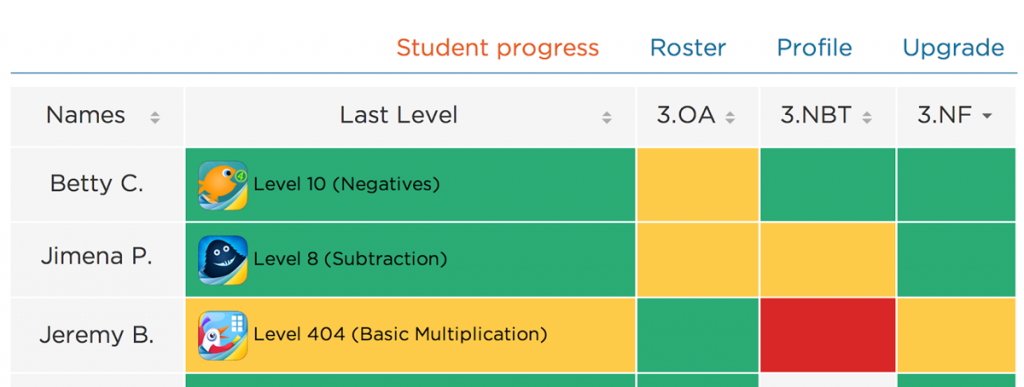Motion Math’s suite of creative math games has drawn the attention of many parents, teachers and investors and now the company is launching a new service, Motion Math Educator, to serve those teachers in the K-6 classroom.
“A Motion Math Educator account gives access to our elementary games, allows teachers to easily load student rosters, and provides a student progress dashboard to help teachers keep students on track and differentiate instruction,” Jacob Klein wrote in a post on their site.

Motion Math’s New service Educator offers access to their award-winning apps, an ability to upload class rosters and the power to track students’ progress against Common Core standards.
It should come as no surprise that the company would develop a system to improve the games’ use in schools. When we checked in with the team earlier this year, co-founder Gabriel Audato told us teachers had emerged as one of the team’s strongest “evangelists.”
“We’ve been thinking a lot about teachers and their feedback. When I show one of my apps to parents a lot of times they say ‘what makes your app different from other educational apps?’ When I give it to teachers, they tell me what makes it different from other educational apps,” he said at the time.
We caught up with Jacob Klein and asked him a few questions about the strategy and thinking behind the new Educator system
gamesandlearning.org: You all have had lots of use of your apps in the classroom without a more formal “Educator” tool. Why develop one now?
Jacob Klein: We decided to develop the Educator now to provide more value to teachers. A few years ago we were focused on both parents and teachers, but we’ve realized that teachers are our greatest customers. Our games are still available for parents to download, but our main priority is the classroom because teachers best understand the educational value of our games and because by working with schools we can help kids who don’t have iPads at home.
gamesandlearning.org: How difficult was it translating game play in to Common Core-related standards?
Jacob Klein: We’re well set up to do this translation because our games aim for the conceptual understanding that’s at the heart of the Common Core. We also read the Standards and Mathematical Practices throughout our design process. It’s still challenging work, in part because the Common Core assessments and item banks are in their infancy. How to make data useful is also a challenge.
Dan Meyer memorably criticized mastery based dashboards, arguing that teacher should “make the judgment that a student had achieved mastery, rather than relying on Khan’s thirteenth-ish attempt at defining mastery algorithmically.” However, a lot of our teacher customers want to know this rough algorithmic sense of how students are progressing, and, as teacher Sarah Fritzke recently wrote us, “I cannot imagine better, more reliable data than that collected while students are invested and engaged.”
So we created our version 1.0 dashboard with this design goal: “The teacher dashboard will empower teachers to be each students’ Aristotle: cultivating flow and differentiating instruction based on on how students transfer Common Core skills to rigorous games.” We’ll be improving it with teacher feedback and with grants we’re received from the Bill & Melinda Gates Foundation and Noyce Foundation to correlate gameplay with Common Core assessments.
gamesandlearning.org: I noticed you use Edmodo as the platform for managing the subscriptions. Can you explain the thinking behind that as well as the pros and cons?
Jacob Klein: We’re using Edmodo as our sign-in partner because many teachers and schools use Edmodo and this way they won’t have to remember another password, re-enter their student roster, or validate their school membership. Also, we’re a small team and didn’t want to have to build our own separate secure sign-in infrastructure. We met Edmodo during our time in co.lab and so far it’s a great partnership.
gamesandlearning.org: If you were just starting out with Motion Math now, would you have built the Educator tool from the outset or was it important to have the suite of apps working first? Why?
Jacob Klein: I’m glad we started with creating a suite of games because ultimately that’s our top priority for students: a delightful learning experience with true intellectual challenge.
Many educational tools go wide, covering a lot of curriculum in a thin, low-quality, flashcard-ish manner, and then show teachers tons of data. No data can compensate for torturing kids with boring, weak tasks – that’s basically re-creating standardized tests! The student experience is our top priority, and now we’re excited to enhance that with teacher data.
gamesandlearning.org: Did this effort grow out of teacher/user need or a business strategy from you all?
Jacob Klein: Both. There are three main reasons for the Educator: data, iteration, and community.
1) Teachers want actionable data on how students are doing in learning games, and how that connects to larger learning goals; a unified dashboard makes sense for communicating this data.
2) Teachers don’t care when a game was released; they just care if it’s good. A download revenue model mostly incentivizes new product creation, and we realized that solely creating new games was not the best way we could serve students. We want to improve, as well as maintain, older games (for example, a new version of our number line game Zoom is in the works.) Subscription incentivizes us to iterate on the whole suite.
3) We want to better know and connect to our customers; we have over 3 million downloads, and only know a tiny percent of the overall community. For these reasons and others, a subscription offering seems to be the most fitting model for an ongoing service to teachers.
